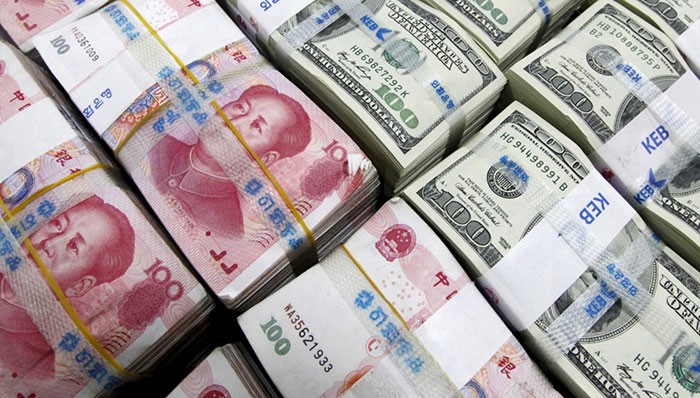
Bloomberg comments: "The risk of a default chain reaction is looming over the $3.6 trillion market for wealth management products in China.WMPs, which traditionally funneled money from Chinese individuals into assets from corporate bonds to stocks and derivatives, are now increasingly investing in each other. Such holdings may have swelled to as much as 2.6 trillion yuan ($396 billion) last year, based on estimates from Autonomous Research this month.The trend has China watchers worried.For starters, it means that bad investments by one WMP could infect others, causing a loss of confidence in products that play an important role in bank funding. It also suggests WMPs are struggling to find enough good assets to meet their return targets. In the event of widespread losses, cross-ownership will create more uncertainty over who's vulnerable -- a key source of panic in 2008 when soured U.S. mortgage securities triggered a global financial crisis."
New York Times prints an AP story reporting that China's decision to allow all married couples to have two children is driving a surge in demand for fertility treatment among older women, putting heavy pressure on clinics and breaking down past sensitivities, and even shame, about the issue.The rise in in vitro fertilization points to the deferred dreams of many parents who long wanted a second child, but were prevented by a strict population control policy in place for more than 30 years.That, in turn, is shifting prevailing attitudes in China regarding fertility treatments — formerly a matter of such sensitivity that couples were reluctant to tell even their parents or other family members that they were having trouble conceiving.
The Guardian reports that fears are growing that there will be a sharp rise in tensions in the South China Seain the next few weeks after an international tribunal delivers a ruling on disputed islands and reefs that Beijing has said it will reject. Western officials say they fear China will react to the ruling of the international tribunal for the law of the sea, which is expected to side with the Philippines, by raising the stakes in the busy trade route, expanding its land reclamation and construction activities to reefs in the Scarborough Shoal, close to Manila.The White House is under pressure from the top US commander in the Pacific and some in Congress to take a tougher line with Beijing and carry out more military patrols close to China's fortified islands, where there have already been close encounters between ships and planes from the two rival powers. Beijing, which argues the tribunal has no jurisdiction on the matter, has warned the US against escalating the conflict, saying it will defend itself if necessary.
- 2016-05-27 G-7 leaders express concern over South China Sea, urge peace
- 2016-05-27 G-7 leaders express concern over South China Sea, urge peace
- 2016-05-26 China warns G7 not to ‘escalate tensions’ in Asia
- 2016-05-25 On the Agenda But Off Guest List, China Eyes G-7 in Japan
- 2016-05-24 Don’t start a fire in Asia, China warns Obama after Vietnam arms embargo lifted
- 2016-05-23 China plans base station for rescue operations in South China Sea
- 2016-05-22 US wields biggest stick in trade dumping fight
- 2016-05-20 Taiwan President Takes Cautious Line on China at Inauguration
- 2016-05-19 China, Denying Close Encounter With American Plane, Points Finger at U.S.
- 2016-05-18 China criticizes US steel anti-dumping measures
- Reuters China to open e-commerce, other sectors to foreign investment: newspaper
- Bloomberg Mickey Mouse Helps China Buck Economic Doom and Gloom
- in.reuters.com Flying man soars over China's Great Wall
- Forbes China To Send Nuke Armed Submarines To Pacific To Counter US
- Financial Times Chinese company withdraws detergent advert after racism outcry
- Forbes Li Na and The $228 Million Wuhan Open Pushing The Boat Out In Paris
- Financial Times Apple sets sights on bigger bite of India
- The Guardian China's richest man opens Wanda World to rival Shanghai Disney
- Los Angeles Times Chengdu, China: city of spicy food, leisurely teahouses and … software parks
- The Diplomat Foxconn: from Worker Suicides to Plastic Workers
- Forbes 'Very Uncool' In China: Will Starbucks Become Mundane?
- nationalinterest.org The Plan Taiwan Needs to Defend against China
- The Diplomat Is China's Period of Strategic Opportunity Over?
- Bloomberg Inside the Rebellion at the Biggest Automotive Website in China
